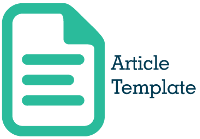POLEMIC CONCERNING IMPLEMENTATION OF NEW ACADEMIC YEAR 2020/2021 DURING THE PANDEMIC OF COVID-19 IN DETIK.COM, KOMPAS.COM, AND CNNINDONESIA.COM
DOI:
https://doi.org/10.35457/jares.v6i1.1105Keywords:
COVID-19, framing analysis, nadiem makarim, online learningAbstract
The Minister of Education and Culture Nadiem Makarim already announced the guidelines for implementing the new school academic year 2020, on June 15, 2020. The execution of the new academic year during the COVID-19 pandemic reaps many pros and cons of several groups. Because many argue that the curriculum explanation in the pandemic period has not detailed, and the fulfillment of the quality of education can not run one hundred percent. Furthermore, the COVID-19 pandemic is still in the peak stages, so it is very worrying if it continues to open the school in the middle of this pandemic. This research uses Robert N. Entman`s Framing Model analysis method with a qualitative approach. The subjects in this research are online media detik.com, kompas.com, and CNNIndonesia.com. This study aims to describe the framing of reporting the implementation of the new school academic year 2020 during the COVID-19 pandemic in online media detik.com, kompas.com, and CNNIndonesia.com is reporting the execution of the new school academic year 2020 during the COVID-19 pandemic. The result of this study indicate that (1) Detik.com, Kompas.com, and CNNIndonesia.com generate public opinion movements which focus on the problem factors that hinder the implementation of the new academic year 2020/2021 during the COVID-19 pandemic, (2) The media coverage by CNNIndonesia.com do not use elements treatment recommendation, (3) Many reports that discuses the type of curriculum during the COVID-19 pandemic.
Downloads
References
Achmad, Z. A. (2014). Perbandingan Sistem Pers dan Sistem Pers di Indonesia (2nd ed.). Surabaya: Lutfansah.
Achmad, Z. A. (2020a). Mediamorphosis: Understanding New Media (review). In E. R. Nawangsari & A. Kriswibowo (Eds.), Potret Masyarakat dan Kebijakan Pemerintah Menghadapi Tantangan Pandemi Covid-19. Surabaya: Penerbit Administrasi Negara.
Achmad, Z. A. (2020b). Pergeseran Relasi Antara Pendengar Radio dengan Institusi Radio dalam Masyarakat Jaringan (Studi Etnografi Virtual pada Radio-radio Budaya di Jawa Timur yang Bermediamorfosis). Universitas Arilangga.
Achmad, Z. A., & Alamiyah, S. S. (2015). Relation Between Political Economic of Media with the Strategies for Radio Positioning to Maintain the Existence of Commercial Radio (Case Study of JJFM Radio in Surabaya). International Conference on Democacy and Accountability (ICoDA), (1), 188–193. Surabaya: Faculty of Social and Political Science, Universitas Airlangga.
Alamiyah, S. S., & Achmad, Z. A. (2015). The Role of Citizen Journalism in Creating Public Sphere in Indonesia. Strengthening Democratic Accountability for Creating Good Governance, 162–167. Surabaya: Faculty of Social and Political Science, Universitas Airlangga.
Anggoro, A. D. (2014). MEDIA, POLITIK dan KEKUASAAN. Jurnal Aristo, 2(2), 25–52.
Assar, S. (2015). Information and Communications Technology in Education. International Encyclopedia of the Social & Behavioral Sciences, 66–71. https://doi.org/10.1016/B978-0-08-097086-8.92104-4
Dal. (2020). Ahli Respon Nadiem Buka Sekolah Saat Pandemi. CNNIndonesia.Com.
Deti. (2020). Komisi X : Panduan Pembelajaran di Tengah Pandemi Belum Detail. Kompas.Com.
Entman, R. M. (1993). Toward clarification of a fractured paradigm. Journal of Communication, 43(4), 51–58.
Eriyanto. (2002). Analisis Framing Konstruksi, Ideology, dan Politik Media. LKIS Yogyakarta.
Inkana. (2020). Pembelajaran Tak Maksimal, Kemendikbud : Jaga Kesehatan Jadi Priortas. Detik.Com.
John, P. D., & Sutherland, R. (2004). Teaching and learning with ICT: new technology, new pedagogy? Education, Communication & Information, 4(1), 101‑107.
Kemendikbud RI. (2020). Panduan Penyelenggaraan Pembelajaran Tahun Ajaran dan Tahun Akademik Baru di Masa Covid-19.
Markham, A. N. (2004). The Internet As Research Context. In C. Seale, G. Gobo, J. F. Gubrium, & D. Silverman (Eds.), Qualitative Research Practice (pp. 328–344). https://doi.org/10.4135/9781848608191.d28
Mln, Ndn, Y. (2020). Ragam Kritik untuk Nadiem Soal Buka Sekolah di Tengah Corona. CNNIndonesia.Com.
Nurdyansyah, N. (2017). Sumber Daya dalam Teknologi Pendidikan. Universitas Negeri Surabaya, 1–22.
Pujilestari, Y. (2020). Dampak Positif Pembelajaran Online Dalam Sistem Pendidikan Indonesia Pasca Pandemi Covid-19. Adalah: Buletin Hukum Dan Keadilan, 4(1), 49–56. https://doi.org/10.15408/adalah.v4i1.15394
Setianingrum, V. M. (2019). Komunikasi Pembelajaran Melalui Virtual Learning (Studi pada Matakuliah Public Speaking Universitas Negeri Surabaya). Translitera: Jurnal Kajian Komunikasi Dan Studi Media, 8(2), 44–54. https://doi.org/10.35457/translitera.v8i02.926
Setiawan, S., Huda, A. M., & Mardana, G. (2016). POLITICAL COMMUNICATION IN THE MASS MEDIA (Framing Analysis News of East Java Governor Election 2013 on Malang Daily Morning Post and Memo Arema at 12th up to 26th August 2013 Period). JARES (Journal of Academic Research and Sciences), 1(2), 1. https://doi.org/10.35457/jares.v1i2.428
Subur, A. (2015). Analisis Teks Media: Suatu Pengantar Analisis Wacana, Analisis Semiotik, dan Analisis Framing. Bandung: Remaja Rosdakarya.
Tomasello, T. K., Lee, Y., & Baer, A. P. (2010). ‘New media’ research publication trends and outlets in communication, 1990-2006. New Media and Society, 12(4), 531–548. https://doi.org/10.1177/1461444809342762
Wageningen, R. Van. (2017). The role of technological change in culture. Retrieved 12 August 2017, from Digital Transformation website: https://www.orange-business.com/en/blogs/connecting-technology/innovation/the-role-of-technological-change-in-culture
Wiranata, I. M. A., Mardliyah, S., & Achmad, Z. A. (2016). The Contestation of Discourses on Sustainable Development in the Controversy of Benoa Bay Reclamation. International Conference on Contemporary Social and Political Affair 2016. RE-EXAMINING GOVERNANCE: STRENGTHENING CITIZENSHIP IN THE CHANGING WORLD. https://doi.org/978-602-18461-4-8
Downloads
Published
Issue
Section
License
Authors who publish with this journal agree to the following terms:
- Copyright on any article is retained by the author(s).
- Author grant the journal, right of first publication with the work simultaneously licensed under a Creative Commons Attribution License that allows others to share the work with an acknowledgement of the work’s authorship and initial publication in this journal.
- Authors are able to enter into separate, additional contractual arrangements for the non-exclusive distribution of the journal’s published version of the work (e.g., post it to an institutional repository or publish it in a book), with an acknowledgement of its initial publication in this journal.
- Authors are permitted and encouraged to post their work online (e.g., in institutional repositories or on their website) prior to and during the submission process, as it can lead to productive exchanges, as well as earlier and greater citation of published work.
- The article and any associated published material is distributed under the Creative Commons Attribution-ShareAlike 4.0 International License














